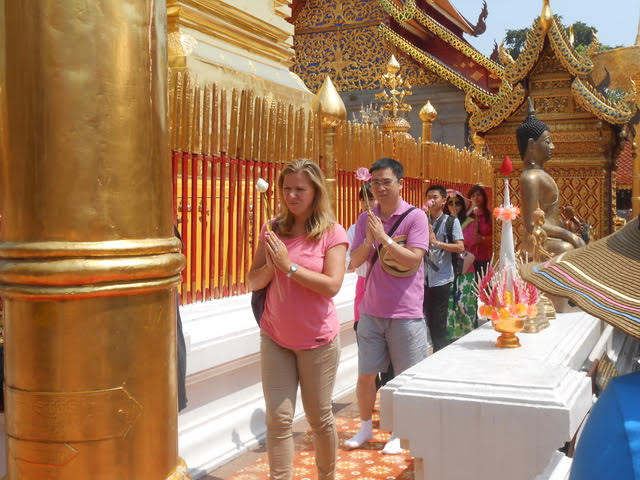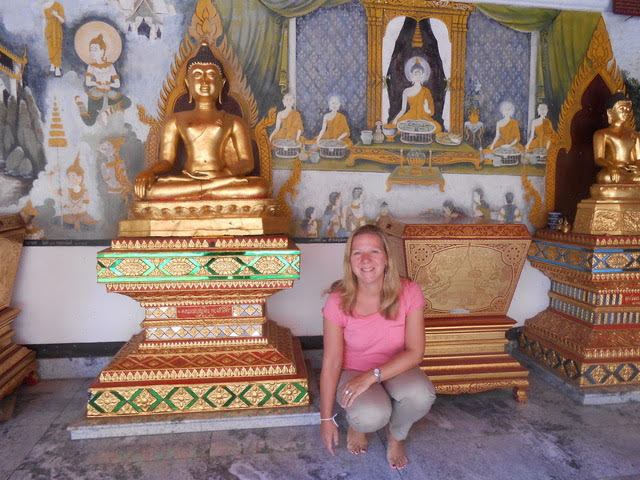I can honestly say that my life now is different than I would ever have visualized it to be.
From starting off in Germany to living the party life in London, I would have never imagined I would be married to a Thai man and live in a small community in Southern Thailand.
You read a lot about people who travel to Thailand to find themselves, and I guess it sounded too good to be true. But there is something mystical about this place.
I am writing this article to lift the lid on what it is that makes it so special and how it changed my life. As with any of my other articles, it is also about sharing my findings and knowledge with others.
I had been traveling to Thailand for over two decades before I eventually moved here. Whenever my body or soul needed to heal, I would feel the pull of Thailand calling me—a call I could never ignore. Whether it was physical healing, such as chronic neck pain or migraines, or emotional healing, like the time my mother passed away, Thailand became a safe space to heal.
I will never forget my first trip and that instant feeling of being at home. I’d like to pinpoint what exactly pulled me to that place, but it isn’t a single thing. It’s most likely a combination of all these things: the people, the Buddhist culture, the weather, the unique Thai massage, and even just the energy of the place. No matter how I felt when I first arrived, I would always leave feeling lighter—feeling healed.
When I first arrived at the village where I now live, I was met with such a friendly welcome, which isn’t something you would get in many places. I was gifted cakes and fresh lemons by passing neighbors. Everybody was friendly, but it is something that still took me a long time to get used to, especially when I was the only farang, a Thai name for foreigners.
Whenever I would go to the talad, a Thai name for market, during my weekly trip, I would attract a lot of stares, which made me feel uncomfortable. But it just took time for them to get used to seeing me (a foreigner), and time for me to accept their own ways.
If you want to become a part of the community here, then you need to embrace the Thai ways and that includes their religion: Buddhism. I live in a Thai Buddhist community with a Thai family in rural Thailand. There was no escaping it, and I didn’t want to, as I felt connected to Buddhism.
I thought I would share with you the words we use for the first greeting to the Buddha:
Namo tassa, bhagavato, arahato, samma sam buddhasa
Honour, to that, blessed one, enlightened one, fully self-enlightened

Our house is not far away from the temple. So every morning and evening, we would hear the monks chanting, and early in the morning, they would pass by our house and we would offer them some food.
During my first months in the village, I attended many tambuns, or ceremonies. A tambun can be held for many occasions, for example, a new house, new business, or graduation. Several monks would come to your house and chant while people, mainly women, would sit in front of them and pray. Part of the ceremony involves sai sin, a string, which signifies merit and protection, and is passed from monk to monk until a circle is formed. Thereafter, holy water is sprinkled over the heads of everyone who is present.
After the ceremony, everyone eats together, and the monks eat first to make sure they are finished by noon.
This form of celebration always makes me feels special and connected; it always leaves me feeling happier and uplifted. The chanting, praying, and eating together feels nurturing to the soul.
Another typical Buddhist custom is merit-making. This could be a daily offering to a small spirit house, which is found in most Thai homes, or giving food to the monks in the early morning.
I have been to several monk celebrations. In Thailand, these celebrations are called oppasombod, which is a happy celebration, where relatives and friends follow the young monk around the temple several times, dancing to ancient Thai music.
Thai people are also superstitious. Before choosing a wedding date, buying a house, test driving a car, or making a big decision, they would first consult a monk.
When we built our house, I wondered why it was built so close to the road when there was so much space in the back of the garden. The monk suggested it would be good to build it there. It was indeed the right decision, because a couple of years later, during the storm pabuk, massive trees in our garden had fallen and would have landed on our house.
Thailand is well-known for its spirituality and healing. I have been fortunate to have accompanied relatives to various healers, monks, and fortune-tellers. Healers are popular in Thailand, and any interaction with them is in exchange for a donation, not a set charge.
I find that when people have exhausted all their other options for healing, they eventually turn to spiritual healers, or if they are ill but don’t have the financial means to seek help through hospitals and doctors, then donating to a healer gives them hope.
I cannot attest to whether the healing works for everyone—each person’s experience is different, but that’s no different than hospitals and doctors either. I have heard many success stories, so I have no doubt there is truth in them.
In a Buddhist nation, one can deeply feel the impermanence of everything and the importance of living in the moment. Forgiveness also plays a major role in everyday life here.
We see so many social media posts about mindfulness, which usually have a picture of the Buddha along with the words “mindfulness” and “meditation,” and go hand in hand with Thailand. From my experience, not all Thai people meditate every day—I promise you. But what they do is act intentionally and mindfully, so daily tasks, such as washing the dishes, cooking, sweeping the floor, or doing the laundry, are done in a meditative way. Eating can also be done mindfully without talking too much.
Although I have been practicing yoga for 20 years, doing Thai massage, and meditating for many years, I didn’t know what it felt like to be mindful until I lived with my Thai family. Through illness and personal suffering, I learned that being mindful is to be fully present in each moment and to do one thing at a time.
However, living with a Thai family that has been brought up on the teachings of Buddhism was another experience that enabled me to fully embody mindfulness. I notice this particularly when I am back in Germany amongst my original culture. Maybe it is a mixture of mindfulness, Buddhism, and the Thai culture. Whatever it is, it feels like a calmer, lighter, and nonattached way of being.
I believe my sister-in-law is the most mindful person I have ever met. She seems truly present in each moment that sometimes I feel astonished. Having lost her mother at a young age, she has truly experienced many hardships in her life, but she is always grateful, calm, and fully present in each moment.
Not everyone gets to live the life that I now live, and I haven’t always chosen the easy route, so I feel this duty to share the learnings and experiences with others. In my writings, whether on a platform or my own blog, you will find that I will weave in the experience and knowledge I have gained, much of which comes from Thailand.
In my book, living with daily pain, I also share more detailed experiences. As a Deep Transformational Coach, I am familiar with many spiritual tools that can help people find peace. My time in this village has given me three of the most important lessons of my life: impermanence, forgiveness, and nonattachment.
Remember, in situations where we struggle, or when problems arise, we must remind ourselves that all is impermanent. Holding on to anger, hatred, or any bad feelings toward another person for too long will never set us free or give us peace, so we must learn the art of forgiveness.
Practicing nonattachment again and again in relationships and also toward material possessions will ultimately give us more peace.
“It is not impermanence that makes us suffer. What makes us suffer is wanting things to be permanent when they are not.” ~ Thich Nhat Hanh


 Share on bsky
Share on bsky





Read 3 comments and reply